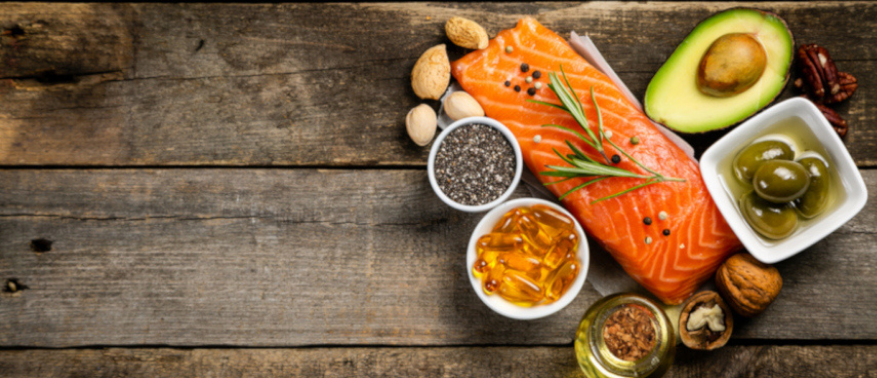Fat often gets a bad rap. But does fat really make you fat? And is there such a thing as "good fat"? Find out here.
Table of contents
First things first: not all fats are created equal! Different types of fat can be distinguished depending on the composition and ratio of fatty acids. But let's start from the beginning.
1. What are fats?
Along with proteins and carbohydrates, fats are one of the so-called macronutrients , the nutrients that provide your body with energy . Like carbohydrates, fats are made up of molecules—in this case, carbon atoms:
Depending on how many such molecules are linked together, a distinction is made between short-, medium-, and long-chain fatty acids. [1]
Depending on how these are connected to each other, a decision is made between saturated and unsaturated fatty acids .
But what does this have to do with calories and body fat? We'll explain more.
BRAINEFFECT HACK : The nutritional information on a food usually indicates whether the fats it contains are saturated or unsaturated.
2. Myth: Does fat actually make you fat?
Regardless of the structure of a fatty acid, one thing remains the same: fat provides a whopping 9.3 calories per gram [1] – making it the most energy- and calorie-dense macronutrient . By comparison, proteins and carbohydrates provide only 4.3 calories per gram.
But does that mean fats are the bad guys in your diet? Not at all! Your body needs certain fats to produce hormones , to keep you going during exercise , and to supply your brain with energy . When used skillfully in a balanced diet, fats are even the key to energy, metabolism, and (brain) performance.
How can you become a fat-burning beast through ketosis? Learn how from Julia Tulipan in this podcast:
3. Good fats, bad fats – which are the right ones?
If you're thinking that you can now chill on the sofa with some chips and enjoy the positive effects of fat in your diet without feeling guilty, we're sorry to disappoint you.
Many industrially processed products contain trans fatty acids , which are actually considered harmful to health [2]. So, you should definitely avoid fries, chips, and the like.
But which fats are good?
In principle, your body can produce saturated fatty acids itself. Therefore, consuming them through food is not essential. The situation is different with unsaturated fatty acids : You absolutely have to supply them to your body through your diet . A 1:2 saturated to unsaturated fatty acid ratio is considered optimal [3].
4. You should consume these high-fat foods
The fats commonly referred to as "good" fats are found in both plant and animal foods . Good sources of plant-based fat include avocados, nuts, seeds, and algae .
BRAINEFFECT HACK : You can now get high-quality vegan omega-3 fatty acids from us in capsule form as VEGAN OMEGA 3 .
The hyped superstar among fats: coconut ! It contains rare medium-chain fatty acids (so-called MCTs), which are especially popular among biohackers and foodies. Special MCT oils and MCT powders contain these popular performance fatty acids in isolated form and can be used in a variety of ways in the kitchen.
BRAINEFFECT HACK : We only offer MCT oils made from 100% caprylic acid C8. Available either as the original ROCKET C8 or in a smart combination with the powerful antioxidant astaxanthin as ROCKET C8 ALPHA and with Omega 7 as ROCKET C8 OMEGA .
For those who aren't vegan or vegetarian, animal fat sources are also an option. The ideal sources are oily fish and krill . Both are particularly rich in the important omega-3 fatty acids.
BRAINEFFECT HACK : You get sustainably caught animal omega-3 fatty acids with our KRILL BOOST capsules.
5. Conclusion
So you see: Fat doesn't make you fat, but it's an important component of your performance . What's crucial is that you choose the right fats , pay attention to the ratio of saturated to unsaturated fatty acids , and generally choose unprocessed foods.
6. Sources
[1] Al MDM, Van Houwelingene AC & Hornstra G (1995) American Journal of Clinical Nutrition. Long chain polyunsaturated fatty acids, pregnancy and pregnancy outcome . [https://academic.oup.com/ajcn/article/71/1/285s/4729466]
[2] de Souza RJ, Mente A, Maroleanu A (2015) BMJ. Intake of saturated and trans unsaturated fatty acids and risk of all cause mortality, cardiovascular disease, and type 2 diabetes: systematic review and meta-analysis of observational studies. [https://www.ncbi.nlm.nih.gov/pubmed/26268692]
[3] Prof. Gerhard Jahreis. Federal Ministry of Labor and Research. Good fat, bad fat. [https://www.gesundheitsforschung-bmbf.de/de/gutes-fett-schlechtes-fett-8035.php]















